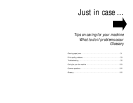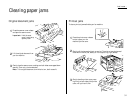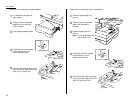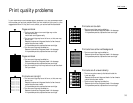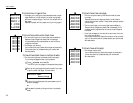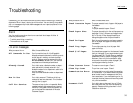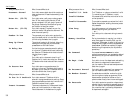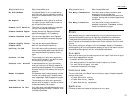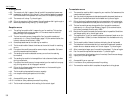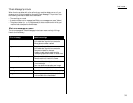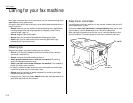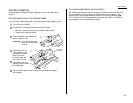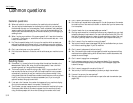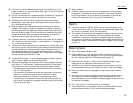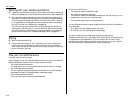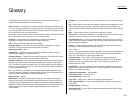
Just in case …
Dialling errors
D
.0.3, The remote unit didn’t respond, the call couldn’t be completed or
STOP
was
D
.0.8 pressed during dialling. Re-try the call. If your machine repeats the message,
call the remote fax unit’s operator and verify that unit is operating properly.
D
.0.2 The remote unit is busy. Try the call again.
D
.0.6, Either the remote unit didn’t respond, the call somehow didn’t go through or
D
.0.7
STOP
was pressed during dialling. Try the call again.
Reception errors
R
.1.1 The calling fax machine didn’t respond to your fax machine. This can hap-
pen if someone dials a wrong number or if the remote machine restricts
access through use of a passcode.
R
.1.2 The two fax machines were incompatible. Your fax machine sends and
receives only
ITU
-
T
Group 3 (see Glossary, page 3.15) fax communication, the
industry standard since the early 1980s.
R
.1.4 Someone pressed
STOP
at the receiving fax machine.
R
.1.5 The fax machine didn’t detect the silence at the end of the call for receiving
an
RCR
.
R
.2.3 Poor phone line conditions made fax communication impossible. Call some-
one at the remote machine’s location.
R
.3.1 The sending fax machine detected too many errors from the receiving
fax machine.
R
.3.3 The sending fax machine is incompatible or had a document feeder problem
during transmission.
R
.3.4 Poor phone line conditions may have prevented your fax machine from prop-
erly printing some or all of the pages it received.
R
.4.2 Either the line disconnected before transmission or the transmitting fax
machine needs maintenance.
R
.4.4 The fax machine has reached its memory capacity.
R
.5.1,
ECM
reception failed (perhaps due to line noise).
R
.5.2
R
.8.1 A compatibility error occurred.
R
.8.10 Line noise or other problems prevented line probing.
R
.8.11 The fax machine timed out while waiting for the retrain signal.
Transmission errors
T
.1.1 The remote fax machine didn’t respond to your machine.Call someone at the
remote machine’s location.
T
.1.2 Your fax machine’s page counter detected a possible document feeder error.
Carefully put the document back into the feeder and try the call again.
T
.2.1 Either the phone line disconnected during transmission or fax communica-
tion became impossible due to bad phone line conditions. Try the call again.
T
.2.2 The two fax machines were incompatible. Your fax machine sends and
receives only
ITU
-
T
Group 3 (see “Glossary,” page 3.15) fax communication,
the industry standard since the early 1980s.
T
.2.3 Bad phone line conditions made fax communication impossible. Conditions
can change rapidly, so try the call again later.
T
.3.1 The page counter in your fax machine detected a document feeder error dur-
ing transmission. Carefully re-insert the document into the feeder and re-try
the call.
T
.3.2 The fax machine didn’t detect the silence indicating the call had ended.
T
.4.1 The telephone line disconnected during transmission because of excessive
modem errors or because remote unit ran out of paper. Try the call again.
T
.4.2 After transmission began, poor line conditions developed. Try the call again.
T
.4.4 Poor line conditions prevented transmission. Try the call again.
T
.5.1,
ECM
transmission failed (perhaps due to line noise). Conditions can change
T
.5.2, rapidly, so try the call again later.
T
.5.3
T
.8.1 A compatibility error occurred.
T
.8.10 Line noise or other problems prevented line probing.
T
.8.11 The remote fax machine didn’t complete the equaliser training phase.
3.8



